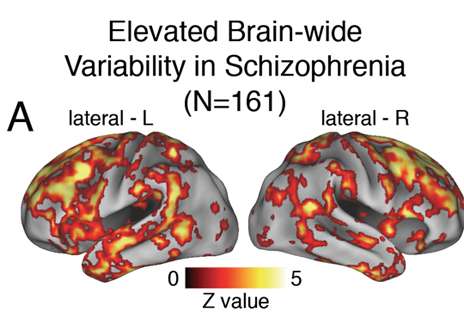Colored areas highlight significant variations in activity of brains in people with schizophrenia not engaged in tasks when compared to control subjects. Credit: Yale University
(Medical Xpress)—In an advance that increases hopes of finding biological markers for schizophrenia, Yale researchers have discovered widespread disruption of signals while the brain is at rest in those suffering from the disabling neuropsychiatric disease.
The Yale team used fMRI scans and created a mathematical model that simulates brain activity to discover the disruptions in global signaling—or patterns of neurological activity while the brain is not involved in any particular task.
Previously, many researchers had thought that the overall brain activity at rest was mostly "background noise" and not clinically important, said Alan Anticevic, assistant professor in psychiatry at the Yale School of Medicine and senior author of the study, reported online May 5 in the Proceedings of the National Academy of Sciences.
"To our knowledge these results provide the first evidence that global whole-brain signals are altered in schizophrenia, calling into question the standard removal of this signal in clinical neuroimaging studies," Anticevic said.
These novel results have vital and broad implications for neuroimaging, as the search for neuropsychiatric biomarkers that could lead to early intervention and improved patient outcomes remains a prominent focus outlined by the National Institute of Mental Health.
More information: "Altered global brain signal in schizophrenia," by Genevieve J. Yang et al. PNAS, 2014: www.pnas.org/cgi/doi/10.1073/pnas.1405289111
Journal information: Proceedings of the National Academy of Sciences
Provided by Yale University























